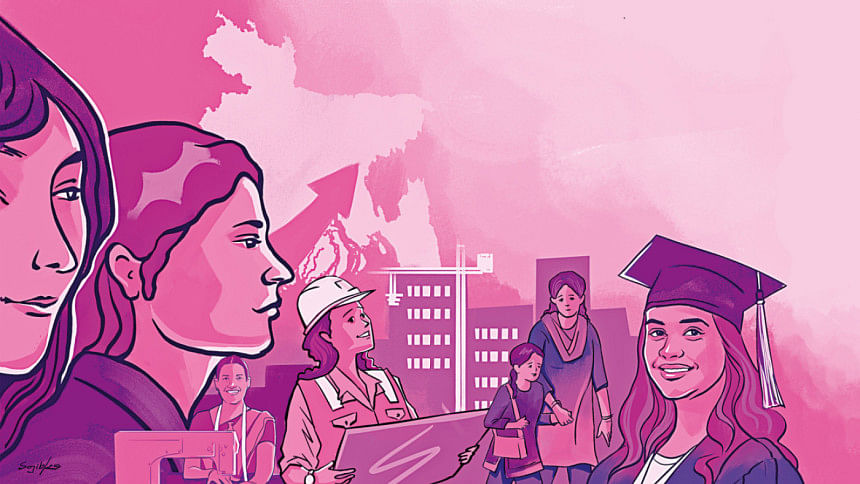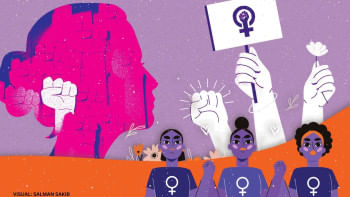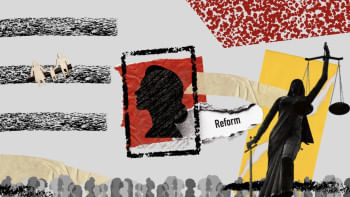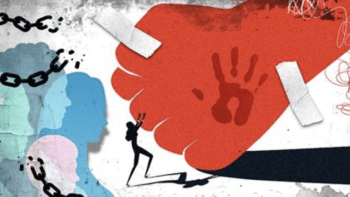Challenging gender equality disempowers women

At last, even the notion of "gender equality" has been challenged. The issue of equality between men and women has been termed by some as "unacceptable." This is what we have arrived at after all these years! Equality has an ethical and moral connotation, not to speak of its economic, social and political importance. Women have fought for it for centuries. It is now a part of national constitutions and international conventions. Last year's mass uprising in Bangladesh had non-discrimination and equality as its cornerstone. Questioning gender equality implies that inequalities are supported. The whole phenomenon is alarming and outrageous. Behind this act lies the increasing trend of animosity and prejudice against women.
The expansion of animosity and prejudice is rooted in toxic patriarchy, a sense of extreme supremacy by men, and increasing fundamentalism. Men suffering from these snatch away women's right to self-determination, control them, engage in stifling women's voices, and attempt to limit their diverse identities.
Women in Bangladesh are still disempowered on many fronts—economic, political, social and cultural. Most factors responsible for the disempowerment of women in Bangladesh are economic, such as economic dependency on men, lack of land ownership, and limited scope for employment. Some are socio-cultural and religious, such as illiteracy, cultural apathy, intra-household discrimination, purdah or seclusion. And some are political, such as indifference to politics, political parties, and limited participation in the electoral process.
Economic empowerment of women is critical for their agency and socio-economic development. In Bangladesh, only 14 percent of the working-age women (aged 15-65) are in active employment and are earning. Less than 10 percent of Bangladeshi women hold managerial positions, while the comparable numbers for men are 88 percent. Furthermore, about 92 percent of employed women work in the informal sector with high gender wage gaps and a lack of benefits. Although the female entrepreneurship rate has been growing, women make up only seven percent of the seven million entrepreneurs in the country and women-led businesses continue to be small. Only 15 percent of Bangladeshi firms have women as owners or co-owners.
Most women are concentrated in low-paying, low-productive agricultural activities, and also in unpaid work, which may adversely affect their economic decision-making ability, thus not contributing to economic empowerment. About 30 percent of employed women are involved in unpaid work. Moreover, women spend 25.8 percent while men spend only five percent of their time in unpaid domestic and care work.
The majority of Bangladeshi women, regardless of where they live and what their employment status is, say that they hand over most of their earnings to their husbands or other members of their family. Women in Bangladesh have less access to finance as men do not allow them to have access to finance. Only 36 percent of Bangladeshi women have bank accounts.
Early marriage continues to impede women's socio-economic empowerment. Currently, almost 51 percent of adolescent girls are married before the legal age of 18. Early marriage limits the capabilities and reduces the opportunities of Bangladeshi women. It is also the most common reason why girls drop out of school. Lack of security is a major dimension of the social disempowerment of Bangladeshi women. Domestic violence is a serious threat to them. The rates of violence against women remain high. According to a 2016 report of Bureau of Statistics (BBS), one in every two married women reported having endured domestic violence during their lifetime. Sexual harassment, acid attacks and suicide are also issues related to their safety and security.
Political disempowerment of Bangladeshi women has its roots in social and cultural norms set by patriarchy. Women are not traditionally expected to have active interests in politics, to be part of political movements, or have some political views, ideas or preferences. They are not expected to have any kind of voice and autonomy to choose candidates during election times and vote for their preferred candidate, particularly in rural areas. But political empowerment of women is essential for their agency, freedom and socio-economic development.
The extreme form of animosity and prejudice against women is reflected in different forms of violence against them. Violence is on the rise in society, and women are being increasingly attacked in various spheres of life. In some cases, those are taking the forms of bodily harm and mental torture; sexual harassments and rape; and in other direct attacks. The question is why these things happen.
Toxic patriarchy manifests itself through a display of power and anger. It turns men into monsters who hold animosity against women.
The extreme fundamentalist ideas emphasise that controlling women is right. It approves the authority of men over women and facilitates "moral policing". When such extreme ideas spread in society, the interference of men over women's self-determination increases. Under such circumstances, men will dictate what women will wear, where women can go, and what they are allowed to do. The expansion of a culture of animosity against women has solidified this sense of extreme supremacy of men.
The animosity and violence against women have become very common, creating a frightful situation. The state and society will have to take responsibility for these, and so do men. The challenge that has recently been raised against gender equality is a prejudice against equality and an animosity against humanity— a threat to us all.
Selim Jahan is former director of the Human Development Report Office under the United Nations Development Programme (UNDP) and lead author of the Human Development Report.
Views expressed in this article are the author's own.
Follow The Daily Star Opinion on Facebook for the latest opinions, commentaries and analyses by experts and professionals. To contribute your article or letter to The Daily Star Opinion, see our guidelines for submission.

 For all latest news, follow The Daily Star's Google News channel.
For all latest news, follow The Daily Star's Google News channel. 











Comments